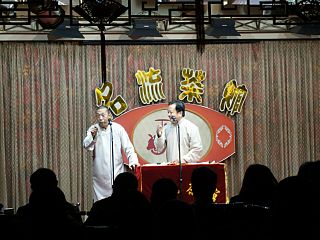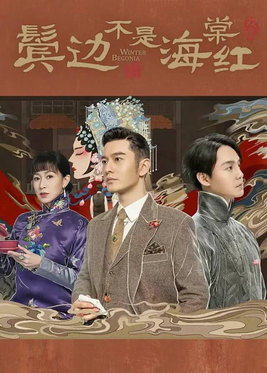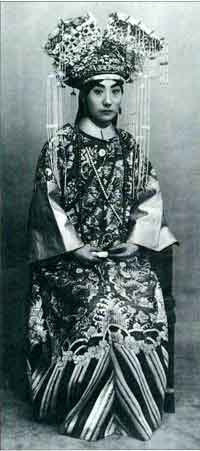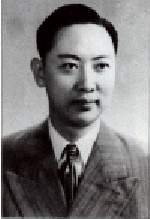
Xiangsheng, also known as crosstalk or comic dialog, is a traditional performing art in Chinese comedy, and one of the most popular elements in Chinese culture. It is typically performed as a dialog between two performers, or rarely as a monologue by a solo performer, or even less frequently, as a group act by multiple performers. The Xiangsheng language, rich in puns and allusions, is delivered in a rapid, bantering style, typically in the Tianjin dialect. The acts would sometimes include singing, Chinese rapping, and musical instruments.

Mei Lan, better known by his stage name Mei Lanfang, was a notable Chinese Peking opera artist in modern Chinese theater. Mei was known as the "Queen of Peking Opera". Mei was exclusively known for his female lead roles (dan) and particularly his "verdant-robed girls" (qingyi), young or middle-aged women of grace and refinement. He was considered one of the "Four Great Dan", along with Shang Xiaoyun, Cheng Yanqiu, and Xun Huisheng.

Dan is the general name for female roles in Chinese opera, often referring to leading roles. They may be played by male or female actors. In the early years of Peking opera, all dan roles were played by men, but this practice is no longer common in any Chinese opera genre.

Beijing People's Art Theatre (北京人民艺术剧院/北京人民藝術劇院) is a theatre company that was founded in June 1952 by drama master Cao Yu. Since its founding, the company has produced nearly 300 dramas of different styles, from classic Chinese themes to adaptations of Molière. The theater company is under the Beijing Municipal Committee of the Chinese Communist Party and is based in the Capital Theatre in Beijing.

Li Chen, also known as Jerry Li, is a Chinese actor and director. He is a cast member and leader of the popular variety program, Keep Running. Li is also known for his roles in the television series Beijing Love Story (2012), Beijing Youth (2012) and The Good Fellas (2016); as well as films Ultimate Rescue (2008), which won him the China Movie Channel Media Awards and Aftershock (2010). Li made his directorial debut in 2017 with Sky Hunter.
The Jiangsu Performing Arts Group, or JPAG, is a theater company established in 2001 and based in Nanjing, Jiangsu, China. It is one of the largest performing arts groups in China and has won eighteen Plum Blossom Prizes and twenty-one Wen Hua Awards. It has also been named "National Key Enterprise for Cultural Export" six times. The group participates in the Chinese Cultural System Reformation.
Madame White Snake is an opera with music by Zhou Long and libretto by Cerise Lim Jacobs, published by Oxford University Press. Awarded the 2011 Pulitzer Prize for Music, it was premiered on Feb. 26, 2010, by Opera Boston at the Cutler Majestic Theatre. It is based on the Legend of the White Snake and was created by Jacobs as a gift to her now late husband. The Pulitzer Committee described the opera as, "a deeply expressive opera that draws on a Chinese folk tale to blend the musical traditions of the East and the West." Zhou stated, "I have been working very hard to blend the East and the West for years." The opera was performed, in English, in Beijing in October 2010. In China Zhou's 2010 English-language opera shares the same title as the traditional Beijing opera version, Legend of the White Snake, Báishézhuàn, but is distinguished by the term "geju" rather than "jingju".

Mei Baojiu was a contemporary Chinese Peking opera artist, also a performer of the Dan role type in Peking Opera and Kunqu opera, the leader of Mei Lanfang Peking Opera troupe in Beijing Peking Opera Theatre. Mei's father Mei Lanfang was one of the most famous Peking opera performers. Mei Baojiu was the ninth and youngest child of Mei Lanfang. For this reason, he was called Baojiu, since in Chinese, jiu means nine. Mei Baojiu was the master of the second generation of Méi School descendant, he was also Mei Lanfang's only child who was a performer of the Dan role of the Peking Opera.

Li Yugang is a Chinese singer, artist, the soloist of China National Opera & Dance Drama Theater and national first class actor. He specialises in "nándàn" (男旦) roles, which is male who plays female role in Peking opera and is also known for his ability to sing in both male and female voices. Li has released a number of CDs.

The China National Opera House (CNOH) or China Central Opera (中央歌剧院) is a State-run opera company based in Beijing, China, and under the Chinese Ministry of Culture. CNOH consists of an opera troupe, a choir, a symphony orchestra and a stagecraft, costume and scenery departments. It is affiliated, through common direction under the Ministry of Culture and Tourism, with the Shanghai Opera House company and other geju companies around China.

Shanghai Jingju Theatre Company is a theatre company based in Shanghai, China, which produces Jingju. It was founded in 1955, with Zhou Xinfang its director. The Shanghai Beijing-Opera Theatre is at 168 Yueyang Road, Xuhui, Shanghai.
Li Liuyi is a Chinese director and playwright of Beijing People's Art Theatre. His theory "Pure Drama" and his related exploration in the field are known as "Li Liuyi Methodology", which is widely acclaimed and researched. Japanese modern theater master Tadashi Suzuki calls him "The most influential stage artist of Asia in the new century".

Wu Jing, also known as Jacky Wu, is a Chinese actor, martial artist and director of Manchu descent. He is best known for his roles in various martial arts films such as Tai Chi Boxer, Fatal Contact, the Sha Po Lang films, and as Leng Feng in Wolf Warrior, its sequel Wolf Warrior 2, and most recently The Battle at Lake Changjin. Wu Jing is one of the most profitable actors in China and his movies are often the highest grossed films in China. Wu ranked first on the Forbes China Celebrity 100 list in 2019 and 23rd in 2020.
Li Shuzhen, better known by her stage name Li Yuru and also known as Li Xueying, was a Chinese opera singer and actress. Descended from Manchu nobility, she is remembered as "one of the great Beijing Opera performers" and played an important role in the acceptance of female singers in female roles (dan). Amid the Cultural Revolution, she was imprisoned from 1966 until the early 1970s. In 1979, she married Cao Yu, one of the most important 20th-century Chinese dramatists, and, following China's opening up under Deng Xiaoping, she ended her life respected as one of the few surviving masters of the dan roles.

You and Me is a modern Peking opera by composer Zhu Shaoyu. Staged by Zhang Yimou, directing his first Peking opera, the show premiered at the National Centre for the Performing Arts, China (NCPA) in 2013. A 2014 performance of the opera was released on DVD by NCPA Classics in China, and Accentus overseas.
Li Shengsu is a Chinese Peking opera singer-actress who plays Dan roles. She began performing traditional Chinese opera from a young age and is a student of Mei Baojiu and other famous opera performers. She is widely considered a Peking opera superstar and has many renown performances. Currently, Li Shengsu is the director of Troupe One of China National Peking Opera Company. Li also holds positions in other organizations as well, including being a member of the Chinese People's Political Consultative Conference. She has received multiple awards and recognition for her performance in Peking opera.

Winter Begonia is a 2020 Chinese television series starring Huang Xiaoming, Yin Zheng, and Charmaine Sheh, based on Shui Ru Tian Er's BL web novel of the same name. It aired exclusively on iQiyi and tells the story of the close relationship between a shrewd businessman and a Peking opera genius right before the World War II. While the original web novel depicted the relationship between the two main men as romantic, the adaptation changed this depiction into a "bromance".
Fu Lian Cheng, initially known as Xi Lian Cheng, was a Peking Opera school established in 1904 in Beijing, the capital of the Qing dynasty. It closed in 1948, during the Chinese Civil War. It was the Peking opera school with the longest history, the largest scale, and the greatest number of graduates.

Wang Yaoqing was a Chinese actor and singer noted for playing the role of a virtuous adult woman, or qingyi, the most important role in Peking opera. He was from Qingjiangpu District, Huai'an in eastern Jiangsu Province.

Zhang Junqiu was a singer of Peking Opera. He played a female, or dan role. His hometown was Dantu, Jiangsu, and he was born in Beijing. His vocal style is called "Zhang pai." It became popular in the 1970s and it is now the most widespread genre of Peking Opera. He was once one of the "four small famous dans." He is far better remembered than the other three.















